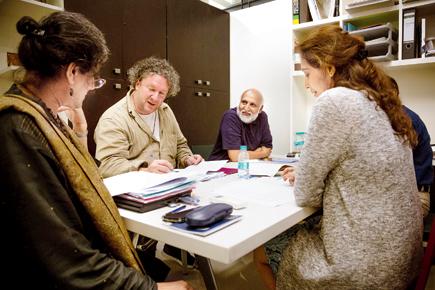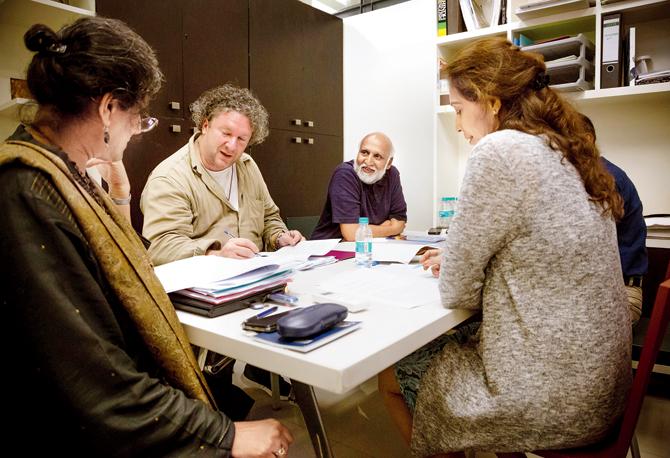50 poets, nearly 20 languages and literary encounters across South Asia. Poets Translating Poets is a project that will help create a platform for poets from South Asia and Germany to translate each other

German and Indian poets at a translation session
An unique project, Poets Translating Poets by Max Mueller Bhavan will introduce German poetry to South Asia for the first time in the region. Spanning countries from Iran, to Sri Lanka, the diversity of South Asia’s languages will be showcased by this project. The Mumbai chapter will inaugurate the first leg of Poets Translating Poets and feature Gujarati, Marathi and German poets like Ulrike Draesner, Thomas Kunst, Aruna Ramchandra Dhere, Pradnya Daya Pawar, Harish Meenashru and Neerav Patel.
 German and Indian poets at a translation session
German and Indian poets at a translation session
ADVERTISEMENT
“Usually, a translator translates poems. We have tried to do things differently. For example in Mumbai, we had a mix of Marathi and German poets. Each poet selected four poems and sent it to Max Mueller Bhavan. We requested an interlinear translator to meet the poets and help them come together. The final translation will, however, be done by the individual poets themselves,” says Jayashree Joshi, programme co-ordinator, Max Mueller Bhavan, Mumbai. Likewise, contemporary poetry from Iran, Bangladesh, Pakistan, India and Sri Lanka will be translated in German by known German authors along with Literaturwerkstatt Berlin (a platform to promote literature in Germany).
A world language
The project will include readings, literature festivals, book fairs, and events at the Goethe-Institute, as well as a dedicated project website. “In the subcontinent, poetry continues to be a prominent form of cultural expression and plays an important role in all societal groups. Dalit poetry, for example, with its extensive audience, addresses the daily life of this underprivileged group. With this project, we hope to undertake a silent process, which will be rewarded with intense trans-cultural collaboration than being a spectacular event,” shares Joshi. “The aim would be to offer a platform for poets from across the globe to communicate with each other and exchange their works and the literary traditions of their country and language. It would give the poets the opportunity to rediscover their work through the detour of another language, and to view it from another perspective,” she feels.
Marathi poet Aruna Ramchandra Dhere tells us that she loved this unique experience. “As a poet, you choose certain words and adjectives which another poet fully understands. Your poetry gets new meaning in a different language,” she says.
Highlighting the challenges she adds, “Sometimes, getting the cultural ethos might get difficult. In one of my poems, I was describing Krishna’s flute. I described him as Draupadi's friend more than a husband and protector. It was difficult for me to explain this to a German Poet whose mythology was different.” German poet Ulrike Draesner believes it’s is okay, at times, to change the references in poetry. “In one of German poems, I had written about a mouse. In the Gujarati version, they it was changed to another small animal because they felt it was better suited. It’s fine. I feel happy when I translate, thinking that I have created new poetry in German, which has a new tone and no imitation,” she concludes.
 Subscribe today by clicking the link and stay updated with the latest news!" Click here!
Subscribe today by clicking the link and stay updated with the latest news!" Click here!







